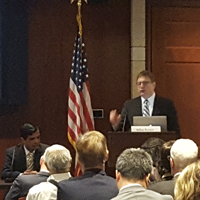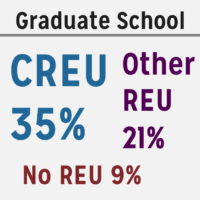CCC Announces New Council Members
The Computing Research Association (CRA), in consultation with the National Science Foundation (NSF), has appointed six new members to the Computing Community Consortium (CCC) Council:
- Nadya Bliss, Arizona State University
- Elizabeth Churchill, Google
- Juliana Freire, New York University
- Keith Marzullo, University of Maryland
- Greg Morrisett, Cornell University
- Manuela Veloso, Carnegie Mellon University
Beginning July 1, the new members will each serve three-year terms. The CCC Council is comprised of 20 members who have expertise in diverse areas of computing. They are instrumental in leading CCC’s visioning programs, which help create and enable visions for future computing research. Members serve staggered three-year terms that rotate every July.
The CCC and CRA thank those Council members whose terms end on June 30 for their exceptional dedication and service to the CCC and to the broader computing research community:
- Lorenzo Alvisi, University of Texas at Austin
- Randal Bryant, Carnegie Mellon University
- Gregory Hager, Johns Hopkins University
- Vasant Honavar, Pennsylvania State University
- Debra Richardson, University of California – Irvine
- Klara Nahrstedt, University of Illinois at Urbana-Champaign
The CCC encourages participation from all members of the computing research community. Each fall, the CCC issues a call for proposals for visioning activities. Each spring, the CCC issues a call for nominations for Council members effective the following July. For more information, please visit the CCC website or contact Dr. Ann W. Drobnis, CCC Director, at adrobnis@cra.org.
Full Bios of New CCC Council Members
Nadya Bliss
Dr. Nadya T. Bliss is the Director of the Global Security Initiative (GSI) at Arizona State University. GSI serves as the university-wide hub addressing emerging security challenges, including borderless threats (cyber security, health security, and resource security). These challenges are often characterized by complex interdependencies and present conflicting objectives requiring multi-disciplinary research and cross-mission collaboration. Prior to taking on the GSI role, Dr. Bliss served as the Assistant Vice President, Research Strategy in the Office of Knowledge Enterprise Development.
Dr. Bliss holds a Professor of Practice appointment (and is a member of Graduate Faculty) in the School of Computing, Informatics, and Decision Systems Engineering; Senior Sustainability Scientist appointment in the Julie Ann Wrigley Global Institute of Sustainability; and affiliate appointments in the School for Future of Innovation in Society, the Center on the Future of War (collaboration between ASU and New America), and the Simon A. Levin Mathematical, Computational and Modeling Sciences Center. Dr. Bliss is also a Senior Fellow at New America. Before joining ASU in 2012, Dr. Bliss spent 10 years at MIT Lincoln Laboratory, most recently as the Group Leader of the Computing and Analytics Group.
Elizabeth Churchill
Currently a Director of User Experience at Google, Dr. Elizabeth Churchill is an applied social scientist working in the area of human computer interaction, computer mediated communication, mobile/ubiquitous computing and social media. Her most recent research focuses on design systems and frameworks.
Originally a psychologist by training, throughout her career Elizabeth has focused on understanding people’s social and collaborative interactions in their everyday digital and physical contexts. She has studied, designed and collaborated in creating online collaboration tools (e.g. virtual worlds, collaboration/chat spaces), applications and services for mobile and personal devices, and media installations in public spaces for distributed collaboration and communication. In addition to being instrumental in the creation of innovative technologies, she has contributed to academic research through her publications in theoretical and applied psychology, cognitive science, human-computer interaction, mobile and ubiquitous computing, and computer supported cooperative work. She has published over 150 peer-reviewed publications, written two co-authored volumes (Foundations for Designing User Centered Systems with Frank Ritter and Gordon Baxter, and Designing with Data with Rochelle King and Caitlin Tan), and has co-edited 5 books. Topics she has written about include implicit learning, human-agent systems, mixed initiative dialogue systems, social aspects of information seeking, digital archive and memory, value sensitive design, feminism and design, AI & agent-based collaborative technologies, frameworks for human-centered systems design and the development of emplaced media spaces. In addition to serving on advisory boards for a number of university departments, she is the current secretary/treasurer of the Association for Computing Machinery.
Juliana Freire
Juliana Freire is a Professor of Computer Science and Engineering and Data Science at New York University. She holds faculty appointments at the Tandon School of Engineering, Center of Data Science, Courant Institute for Mathematical Science, and Center for Urban Science. She is the executive director and principal investigator of the NYU Moore-Sloan Data Science Environment. Her recent research has focused on big-data analysis and visualization, large-scale information integration, web crawling and domain discovery, provenance management, and computational reproducibility. Prof. Freire is an active member of the database and Web research communities, with over 180 technical papers, several open-source systems, and 12 U.S. patents. She is an ACM Fellow and a recipient of an NSF CAREER, two IBM Faculty awards, and a Google Faculty Research award. She has chaired or co-chaired workshops and conferences, and participated as a program committee member in over 70 events. Her work has been funded by the National Science Foundation, DARPA, Department of Energy, National Institutes of Health, Sloan Foundation, Gordon and Betty Moore Foundation, W. M. Keck Foundation, Google, Amazon, AT&T, the University of Utah, New York University, Microsoft Research, Yahoo! and IBM.
Keith Marzullo
Dr. Keith Marzullo is Dean of the College of Information Studies (also known as the iSchool) at the University of Maryland, College Park. He joined the iSchool from the White House Office of Science and Technology Policy, where he directed the Networking and Information Technology Research and Development (NITRD) Program. NITRD enables interagency coordination and cooperation among the over 20 member agencies which together spend over $4B a year in NIT R&D. Dr. Marzullo has also worked at the National Science Foundation (NSF), where he served as the Division Director for the Computer and Network Systems (CNS) Division in the Computer & Information Science & Engineering (CISE) Directorate, at UC San Diego where he was the CSE Department chair, and Cornell University. Dr. Marzullo received his Ph.D. in Electrical Engineering from Stanford University, where he developed the Xerox Research Internet Clock Synchronization protocol, one of the first practical fault-tolerant protocols for keeping widely-distributed clocks synchronized with each other. His research interests are in distributed computing, fault-tolerant computing, cybersecurity, and privacy.
Greg Morrisett
Greg Morrisett is the Dean of Computing and Information Sciences (CIS) at Cornell University, which houses the departments of Computer Science, Information Science, and Statistical Sciences. He received his bachelor’s degree from the University of Richmond and both his Master’s and Doctorate degrees from Carnegie Mellon University.
Professor Morrisett’s research focuses on the application of programming language technology for building secure, reliable, and high-performance software systems. A common theme is the focus on systems-level languages and tools that can help detect or prevent common vulnerabilities in software. Past examples include typed assembly language, proof-carrying code, software fault isolation, and control-flow isolation. Recently, his research focuses on building provably correct and secure software, including a focus on cryptographic schemes, machine learning, and compilers.Morrisett is a Fellow of the ACM and has received a number of awards for his research on programming languages, type systems, and software security, including a Presidential Early Career Award for Scientists and Engineers, an IBM Faculty Fellowship, an NSF Career Award, and an Alfred P. Sloan Fellowship.
Manuela Veloso
Manuela M. Veloso is the Herbert A. Simon University Professor in the School of Computer Science at Carnegie Mellon University. She is the Head of the Machine Learning Department. She is a Past President of AAAI (Association for the Advancement of Artificial Intelligence), and the co-founder and a Past President of the RoboCup Federation. She is a fellow of ACM, IEEE, AAAS, and AAAI.
Manuela researches in artificial intelligence, with a focus in robotics and machine learning. Her long-term research goal is the effective construction of autonomous agents where cognition, perception, and action are combined to address planning, execution, and learning tasks. Her vision is that multiple intelligent AI agents, coexisting with humans, with different sets of complementary capabilities will provide a seamless synergy of intelligence. With her students, she has contributed a variety of autonomous robots. Her robot soccer teams have been RoboCup world champions multiple times, and the CoBot mobile service robots have autonomously navigated for more than 1,000km in multi-floor university buildings. She founded and directs the CORAL research laboratory, for the study of agents that Collaborate, Observe, Reason, Act, and Learn. See www.cs.cmu.edu/~mmv for details.










